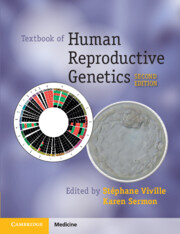Book contents
- Textbook of Human Reproductive Genetics
- Textbook of Human Reproductive Genetics
- Copyright page
- Contents
- Contributors
- Chapter 1 Basic Genetics and Cytogenetics: A Brief Reminder
- Chapter 2 Application of Whole-Genome Technologies to Assisted Reproductive Treatment
- Chapter 3 Meiosis: How to Get a Good Start in Life
- Chapter 4 Chromosomes in Early Human Embryo Development: Incidence of Chromosomal Abnormalities, Underlying Mechanisms, and Consequences for Diagnosis and Development
- Chapter 5 DNA Is Not the Whole Story: Transgenerational Epigenesis and Imprinting
- Chapter 6 Genes Are Not the Whole Story: Retrotransposons as New Determinants of Male Fertility
- Chapter 7 Chromosomal Causes of Infertility
- Chapter 8 Genetics of Human Male Infertility: The Quest for Diagnosis and Treatment
- Chapter 9 Genetics of Human Female Infertility
- Chapter 10 Preconception Genetics Analysis/Screening in IVF
- Chapter 11 Genetic Counseling in Assisted Reproductive Treatment
- Chapter 12 Mitochondrial Genetics in Reproductive Medicine
- Chapter 13 Preimplantation Genetic Testing
- Chapter 14 Epigenetics and Assisted Reproductive Technology
- Chapter 15 Human Reproductive Genetics in Medically Assisted Reproduction: Ethical Considerations
- Index
- References
Chapter 14 - Epigenetics and Assisted Reproductive Technology
Published online by Cambridge University Press: 15 December 2022
- Textbook of Human Reproductive Genetics
- Textbook of Human Reproductive Genetics
- Copyright page
- Contents
- Contributors
- Chapter 1 Basic Genetics and Cytogenetics: A Brief Reminder
- Chapter 2 Application of Whole-Genome Technologies to Assisted Reproductive Treatment
- Chapter 3 Meiosis: How to Get a Good Start in Life
- Chapter 4 Chromosomes in Early Human Embryo Development: Incidence of Chromosomal Abnormalities, Underlying Mechanisms, and Consequences for Diagnosis and Development
- Chapter 5 DNA Is Not the Whole Story: Transgenerational Epigenesis and Imprinting
- Chapter 6 Genes Are Not the Whole Story: Retrotransposons as New Determinants of Male Fertility
- Chapter 7 Chromosomal Causes of Infertility
- Chapter 8 Genetics of Human Male Infertility: The Quest for Diagnosis and Treatment
- Chapter 9 Genetics of Human Female Infertility
- Chapter 10 Preconception Genetics Analysis/Screening in IVF
- Chapter 11 Genetic Counseling in Assisted Reproductive Treatment
- Chapter 12 Mitochondrial Genetics in Reproductive Medicine
- Chapter 13 Preimplantation Genetic Testing
- Chapter 14 Epigenetics and Assisted Reproductive Technology
- Chapter 15 Human Reproductive Genetics in Medically Assisted Reproduction: Ethical Considerations
- Index
- References
Summary
Since the birth of the first baby via in vitro fertilization (IVF) in 1978, there has been concern about the safety of IVF and other assisted reproduction technology (ART) procedures for the health of ART-conceived children. Data show that ART singletons are at increased risk for adverse perinatal outcomes such as low birthweight and being small for gestational age, and congenital malformations [1]. The biological mechanism behind these risks is mainly unresolved. Since the publication of a few case reports on the incidence of rare imprinting disorders such as Angelman and Beckwith–Wiedemann syndromes in ART-conceived children, epigenetic deregulation has gained increasing attention as a possible common cause for the adverse outcomes. This led to an expansion of ART literature on epigenetic effects. In this chapter, I focus on the current knowledge of epigenetic disturbances in humans, reported after ART in general and in relation to specific ART components, and the difficulties encountered in these kinds of studies. When needed, animal studies will also be mentioned. The subfertility of the population as a possible cause for the epigenetic deregulation is also taken into consideration. Finally, I discuss whether epigenetic effects can be related to the reported health outcome in ART children and if these possible derangements can affect their health at adult age.
- Type
- Chapter
- Information
- Textbook of Human Reproductive Genetics , pp. 202 - 218Publisher: Cambridge University PressPrint publication year: 2023

